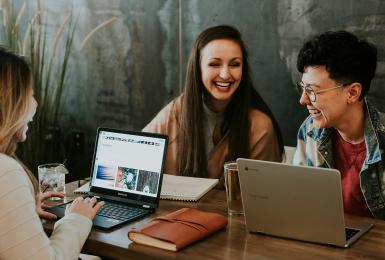Learn more about what you can expect from your online experience at Champlain.
Interviews can be intimidating for many job applicants: even after you've successfully completed a phone interview and prepared by practicing your answers, reviewing common interview questions, and doing your research on the company, you still might feel nervous about how you'll perform.
Most of us have a nervous habit or two that we turn to in times of stress (think speaking quickly, tapping a foot, playing with hair, or looking down at our hands), and the anxiety-provoking atmosphere of an interview often brings them to the surface. Luckily, there are a few simple things you can do to hide these habits and appear more self-assured - and it all comes down to body language. Your body language during an interview can make or break your success: do it right and you will come across as poised, confident, and impressive to your interviewer!
Why Does Your Body Language In an Interview Matter?
When preparing for an interview, we focus most on what we're going to say, not how we're going to say it, or how we come across when we do. But overlooking the importance of body language during an interview is a missed opportunity. Your body language is one of the first things people notice about you, especially in a high-stakes situation like an interview, where everything is under more scrutiny.
Perception is everything: according to experts, "When someone first meets you, an evaluation is quietly and unconsciously taking place. There is an incredible amount of processing going on as millions of neurons in the brain are activated and working to determine if they believe you to be credible, trustworthy, and likable. That impression is based primarily on your nonverbal communication."
It might seem like this shouldn't be your concern - after all, if you know you're a good person, shouldn't the employer be able to figure that out? But body language is a tricky thing, and without establishing good habits, you might be conveying a different message to those you're interacting with than you intend to.
Trying to change your body language might feel like an impossible task. How can you come across as confident when you're nervous, or make someone trust you just by looking at you? But with an awareness of key body language tricks and a bit of practice, it's easy to do, and will be well worth the effort when you make a positive impression during your next interview.
Tips for Better Body Language During an Interview
Here are some of the key things to work on when trying to improve your body language for your next interview.
Make Eye Contact
Maintaining good eye contact is essential for building a rapport with your interviewer, and is said to convey trustworthiness and and confidence. A lack of eye contact, on the other hand, might make your interviewer think you're hiding something, or are insecure about your responses to their questions.
Eye contact can be challenging for many people, because they find it awkward or uncomfortable. It can be a bit tricky to find a balance that works for you, but practice with a friend and try to be natural. You don't have to maintain unbroken eye contact for the entire interview (the goal is not to be staring, or to come across as too intense). You can look down or around the room occasionally, but try to look directly at the person you're speaking as much as possible.
If it makes you too uncomfortable to look into their eyes, try focusing on the middle of their forehead - the effect is the same, and it sometimes feels a bit easier.
Work On Your Handshake
This is some of the most common advice out there, but it's widespread for a reason: it's true! A firm handshake conveys confidence and self-assurance, and it's one of the key indicators of those qualities that potential employers look for (both at the start and the end of the interview).
Maintain Good Posture
This is important both when you're walking or standing, and when you're sitting. When you're walking into the interview or through the office, keep your head high and your shoulders back; when you're sitting down, don't slouch - sit up straight. Leaning back or to the side could convey disinterest or a lack of engagement.
Show That You're Engaged in the Conversation
Beyond posture, there are a few things you can do to show that you're engaged in the conversation. Lean forward slightly, angle your body to mirror your interviewer's position, and nod at appropriate moments. These are minor adjustments to your body language, but they go a long way in establishing a genuine rapport between you and your interviewer.
Be Aware of Your Hands
Many people use their hands when they're nervous, and this can show up in a variety of ways (including doodling, playing with your hair, biting your nails, or talking with your hands) when you're under pressure. If this is something you struggle with, pay close attention to what you're doing. Taking notes can help, as can simply holding your hands clasped in your lap or on the table in front of you. Don't cross your arms to avoid these nervous habits - this can signal defensiveness or being closed-off.
Smile - But Be Genuine!
A smile goes far - experts say "a genuine smile is often contagious and can immediately create a more positive environment." In general, you'll want to keep your expression positive, smiling often and laughing when appropriate during the conversation to convey friendliness and to immediately create a rapport with your interviewer. Be careful not to go over the top, though - you don't want it to come across as fake.
Remember to Practice
Many of these body language interview skills don't come easily to most people - chances are, there's at least one you need to work on. But if you dedicate some time to practicing with a friend or family member who can give you feedback on how you're coming across, it'll go a long way towards creating a positive impression during your next interview.
Download Online Experience Guide
Learn what you can expect from your experience at Champlain College Online.

Online Experience Guide Download
I acknowledge that, by clicking the "submit" button, I am giving my express written consent to Champlain College and its representatives to contact me about educational opportunities via email, text, or phone, at the phone number above, including my mobile phone, using an automatic dialer, or pre-recorded message. Message and data rates may apply. I understand that my consent is not a requirement for enrollment, and I may withdraw my consent at any time.






